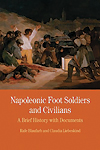
Napoleonic Foot Soldiers and Civilians: A Brief History with Documents, by Rafe Blaufarb and Claudia Liebeskind, Bedford/St. Martin’s Press, Boston, 2011, $15.95
The Napoleonic wars generate hundreds of books every year, usually devoted to the military and political aspects of the era. But given the millions of lives the wars affected throughout Europe and even the United States, it should be just as interesting to know something about what the common people were thinking at the time. In Napoleonic Foot Soldiers and Civilians, Rafe Blaufarb, director of the Institute on Napoléon and the French Revolution at Florida State University, and Claudia Liebeskind, associate professor of history at FSU, have compiled memoirs and diaries left by common soldiers, providing their perspective on the first total war in modern history.
Not all of the participants were heroes. Benjamin Randell Harris, for example, had been a shepherd before he enlisted in the 66th Regiment of Foot and later transferred to the elite 95th Rifles, in which he expected to find glory: “…a glory they were not long in achieving,” he wrote in his memoir, “as out of the 150 of the Leicestershire, in which we enlisted in Hastings, scarce one man, I should say, who served, but could have shewn at the year’s end some token of the fields he had fought in; very many found a grave, and some returned to Hythe with loss of their limbs.”
Among the important documentary material the authors include is that of Jakob Walter (1788–1864), a soldier from the Duchy of Württemberg whose hitherto unknown memoir may be the only account by a common soldier in the Grande Armée during Napoléon Bonaparte’s invasion of Russia. Walter passed it to one of his sons, who immigrated to Kansas in 1856; it was rediscovered in the 1930s. As Napoléon watched the remnants of his army retreat toward the Berezina River, Walter observed: “[His] outward manner seemed indifferent and unconcerned over his soldier’s wretchedness. He may have felt only ambition and lost his honor in his heart. Although the French and Allies shouted oaths and curses about his guilty person, he heard them unmoved.”
The authors’ introduction describes the nature of the Napoleonic wars and ends with 11 questions for future consideration. The major question, of course, is whether a war is ever good. The authors found an answer in the diary of Friedrich Ludwig Burka, a prosperous farmer from Wiesbaden: “None of us will forget this year. Whoever has not experienced it personally would not believe the hardships war brings. Thousands dead on the battlefield, thousands crippled, and even more in poverty, misfortune and misery, thousands who go to an early grave because of this. It is impossible to describe all the misery of war.” Whoever reads this fascinating and revealing book might be inclined to agree with him.
—Thomas Zacharis




